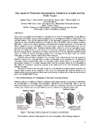 One of the key problems in healthcare informatics is the lack of interoperability among different healthcare information systems. Interoperability can be investigated in different categories in the eHealth domain, such as the interoperability of the messages exchanged between healthcare applications, interoperability of Electronic Healthcare Records (EHRs), interoperability of patient identifiers, coding terms, clinical guidelines and healthcare business processes. Furthermore, all these categories can be investigated in two major layers: syntactic interoperability layer and the semantic interoperability layer. Syntactic interoperability (which we term as messaging layer), involves the ability of two or more systems to exchange information. Syntactic interoperability involves several layers: network and transport layer (such as Internet), application protocol layer (such as HTTP or email), messaging protocol and message format layer (such as ebXML messaging or SOAP), and the sequencing of the messages.
One of the key problems in healthcare informatics is the lack of interoperability among different healthcare information systems. Interoperability can be investigated in different categories in the eHealth domain, such as the interoperability of the messages exchanged between healthcare applications, interoperability of Electronic Healthcare Records (EHRs), interoperability of patient identifiers, coding terms, clinical guidelines and healthcare business processes. Furthermore, all these categories can be investigated in two major layers: syntactic interoperability layer and the semantic interoperability layer. Syntactic interoperability (which we term as messaging layer), involves the ability of two or more systems to exchange information. Syntactic interoperability involves several layers: network and transport layer (such as Internet), application protocol layer (such as HTTP or email), messaging protocol and message format layer (such as ebXML messaging or SOAP), and the sequencing of the messages.
Syntactic interoperability guarantees the message to be delivered but does not guarantee that the content of the message will be machine processable at the receiving end. To guarantee message content interoperability, either the message content should conform to a single machine processable standard or semantic interoperability must be provided. Semantic interoperability is the ability for information shared by systems to be understood at the level of formally defined domain concepts.
This paper describes the concepts involved in eHealth interoperability; briefly assesses the current state in some of the countries in the world and discusses the technical issues to be addressed for achieving interoperability and concludes by providing links to the results achieved in the IST 027065 RIDE Project.
Download "Key Issues of Technical Interoperability Solutions in eHealth and the RIDE Project" Publication (.pdf, 144KB)
Coordinator contact details:
Prof. Dr. Asuman Dogac
Department of Computer Engineering
Director of Software Research & Development Center
Middle East Technical University
06531, Ankara, Turkey
http://www.srdc.metu.edu.tr/~asuman
Phone: +90 - 312 - 210 5598 or +90 - 312 - 210 2076
Fax: +90 - 312- 210 5572 or +90 - 312 - 210 1259
For further information, please visit: RIDE Project